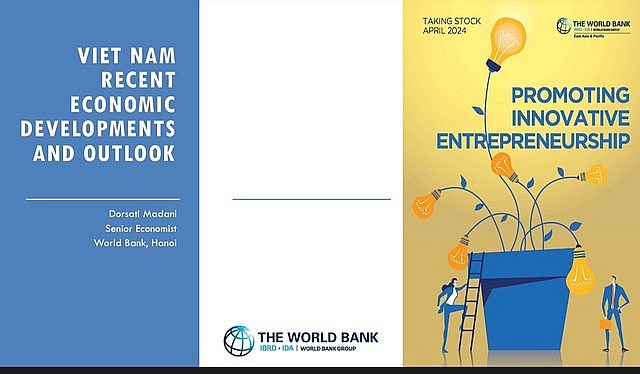Vietnam’s Economy Gradually Rebounds: World Bank
 |
| WB: Vietnam’s economy is showing different signs of recovery, with growth forecast to reach 5.5% in 2024 and gradually increase to 6.0% in 2025 |
Signs of recovery in early 2024
After experiencing a period of deceleration in 2023, the economy is showing some signs of recovery in early 2024.
Exports are recovering, domestic consumption and private investment are also on the rise. Exports at constant prices are expected to increase by 3.5% in 2024, reflecting improving global demand.
In addition, the real estate sector is also expected to recover stronger at the end of this year and next year, boosting domestic demand as investors and consumers gradually regain confidence. Total investment and private consumption at constant prices are expected to increase by 5.5% and 5% in 2024, respectively.
In the first quarter of 2024, the economy achieved growth of 5.66% (compared to the same period last year).
Merchandise exports rebound strongly, up 17.2% year-on-year in the first quarter of 2024, compared with -11.6% in the same period last year, thanks to a sharp increase in exports to the US and Europe (up 25.5% and 16.3%, respectively, over the same period last year).
Real investment (at constant prices) increased by 4.7% over the same period compared to zero growth in the first quarter of 2023, thanks to the strong contribution of FDI, public investment increasing slightly, while private investment remaining weak.
Vietnam’s economic position improved in 2023, thanks to a large current account surplus.
The balance of payments (BOP) reaches a surplus of 1.3% of GDP compared to a deficit of 5.6% of GDP in 2022. The current account surplus is widened to 6.7% of GDP in 2023, from a deficit of 0.3% of GDP in 2022.
The reason is because the goods trade balance reached a large surplus (10% of GDP), remittance flows continued to be maintained (estimated at 3.1% of GDP), while the service trade account deficit decreased (down to -2.2% of GDP in 2023 from -3.1% of GDP in 2022).
This is because the number of foreign tourist arrivals continues to recover, reaching nearly 12.6 million in 2023, compared to 3.7 million in 2022.
Policies to support growth and promote reform
The World Bank report stated that the Government plans to continue maintaining expansionary fiscal policy in 2024, but will return to tightening fiscal policy in the following years.
The WB believes that risks and opportunities for the above forecast outlook are generally in balance, lower-than-expected growth in developed economies, and China may reduce foreign demand for Vietnam’s export products.
Furthermore, rising geopolitical tensions and climate-related natural disasters will increase risks for Vietnam. Domestically, the recovery speed of the real estate market is not as expected, which may affect investor psychology and private sector investment.
Looking positively, higher-than-expected global growth will help Vietnam’s exports recover stronger than expected. Sustained expansionary fiscal policy measures can support economic recovery, while stabilizing the financial sector needs to remain a top priority.
 |
| Processing tra fish at Tran Hân Co Ltd. The Vietnamese economy faced significant challenges last year due to a slowdown in exports but rebounded in the second half, exceeding expectations with a growth rate of 5.1 per cent. Photo: VNS |
The report emphasizes the importance of continuing to support the economy through fiscal policy to underpin the recovery.
The report recommends accelerating the pace of implementation of infrastructure investment projects funded by public resources.
This would help stimulate the economy further, with the potential for GDP growth of 0.1 percentage points for every 1 percentage point increase in public investment as a proportion of GDP. Meanwhile, in terms of monetary policy, the room for further interest rate cuts is limited due to the interest rate difference between domestic and international markets.
The post Vietnam’s Economy Gradually Rebounds: World Bank appeared first on Vietexplorer.com.
Comments
Post a Comment